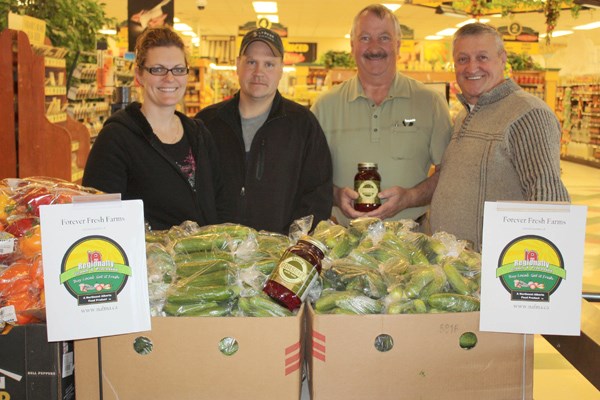Consumers are becoming more interested in knowing about where their food comes from and how it is grown, according to some producers. That’s why Community Futures St. Paul-Smoky Lake initiated a local brand called “Regionally Grown & Processed” to identify food grown or made in the Lakeland area.
“When you see that brand on our product, you know it is from this area, whether it’s St. Paul, Smoky Lake or Cold Lake,” said Jerry Repka with Forever Fresh Farms, which sells vegetables in local stores.
His wife and business partner, Nicole, added that when they signed the contract, Community Futures checked out their business, located directly south of Bellis, near the North Saskatchewan River, to make sure they were actually growing the vegetables and not just re-marketing product from another place.
They currently grow cucumbers, tomatoes, green beans and lettuce, all pesticide-free. They use good bugs to kill the bad bugs and bumblebees for pollination. “We don’t spray anything, you can eat it right off the vine,” said Jerry.
They start growing plants between November and January so they will be ripe before garden season starts. It started as a way to have healthy food for their children and grew from there, said Jerry.
Another locally produced product available on the shelves of Co-op sporting the local food brand is Beetnik Borscht. Eugene Dmytriw said that he and his wife Marcia Arnot were growing organic beets and potatoes and decided that selling borscht would be a good idea as no one else was doing it.
“A lot of the baba’s are not around anymore,” said Dmytriw.
“We started selling it at farmers’ markets and got good feedback so decided to expand into some delis and local stores.”
They use organic chicken broth so the product is gluten free. They also use their own beets, potatoes and carrots, which are grown on their farm near Two Hills without chemicals or fertilizers, but are not certified organic.
It took about four years to go through the process of having the borscht tested so that it could be properly labeled and bar-coded.
Dmytriw said the retailers, particularly in Edmonton, really like the brand. The borscht has been available commercially for about four years now.
Although they are not getting rich from it, he said they do it because of the great feedback from customers. “It’s more like a hobby,” said Dmytriw.
Both of the businesses welcome people to come out and check out their farms to see how the food is produced. That way they will know what they are eating.



